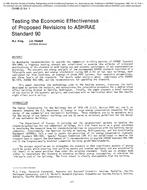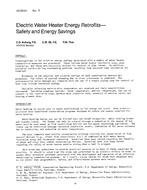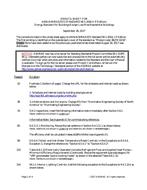The goal of this study was to investigate how well the performance of a series fan-powered terminal unit (FPTU) could be predicted by combining the models of its individual components, namely fan/motor/controller, damper, and housing. Eight series FTPUs, from three manufacturers, with electronically commutated motors (ECMs) were investigated. In Part I of this paper, the fan airflow and power performance were experimentally studied. The corresponding empirical models were established fromthe measured data.Part II of this paper described the development of primary and plenum airflow models by testing dampers and housings. The primary airflow model predicted the airflow throughdampers asa function of damper angles and damper differential pressures. The plenum airflow model estimated the amount of air induced into housings by using the housing differential pressures and plenum air inlet areas. The overall performance of a series FPTU was evaluated by systematically assembling its component models.
Comparisons were made between model outputs and experimental data from previous studies. While the predicted airflows were in agreement with measurements, the componentbased model underestimated fan-power consumptions for some units. This discrepancy may be caused by fan-system effects that occur as a consequence of flow mixing and swirl inside housings. These flow distortions create a condition that is different from the condition used in the laboratory fan tests.
Citation: ASHRAE Transactions – Volume 120, Part 2, Seattle, WA
Product Details
- Published:
- 2014
- Number of Pages:
- 11
- File Size:
- 1 file , 3.4 MB
- Product Code(s):
- D-SE-14-026


